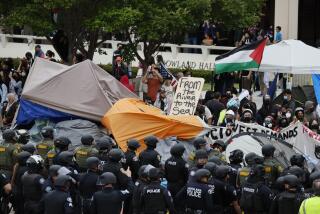Pro-Democracy Peking Student Rallies Banned
PEKING — Authorities Friday banned unauthorized demonstrations in Peking as new pro-democracy protests were reported in an eastern provincial capital, bringing the number of cities affected by the movement to at least 10.
The ban came just three days after an estimated 1,000 students from Peking University marched briefly through the university section of the city in support of pro-democracy demonstrations by tens of thousands of their counterparts in Shanghai, China’s largest city.
Under the regulations passed by the Peking Municipal People’s Congress and announced on the nationwide evening television news, demonstrations are banned without a police permit.
No Great Hall Protests
The eight-point announcement also forbids all demonstrations at the Great Hall of the People in central Tian An Men Square, the Zhongnanhai government compound and at the airport. The announcement is similar to a six-point official circular posted Monday in Shanghai that banned marches without a police permit.
The ban coincides with a mounting government publicity campaign, warning of the threat posed to social and economic order by the student protests sweeping China.
Thousands of students calling for more democracy have held four straight days of protests this week in the eastern provincial capital of Nanjing.
Foreign teachers and students at Nanjing University said the peaceful protests began Monday and reached a climax Wednesday when about 5,000 chanting students watched by thousands of workers marched through the city’s college district.
They said five or six speakers addressed the crowd, with one booed for urging restraint and another voicing opposition to the “dictatorship of the Communist Party.”
A smaller demonstration was held Thursday night, but most of the students from Nanjing University did not take part because campus protest leaders held a meeting to decide future actions, one teacher said in a telephone interview.
‘Up With Democracy’
He said the students marched daily on the provincial government headquarters chanting, “Up with democracy, and down with autocracy and bureaucracy.” The protesters were also demanding an independent student association.
Political posters calling for democracy have also appeared on Nanjing University bulletin boards, the teachers said.
The national government, through the state-run press, has unleashed a media blitz against student activists, with four consecutive days of front-page editorials describing the protests as a threat to stability and economic development.
The press continued its harsh criticisms of the Shanghai demonstrations and said China’s largest city had been paralyzed by the street marches.
The People’s Daily, the organ of the Communist Party, quoted one city bus company employee as saying his fellow workers “hope that Shanghai students will protect and cherish the current good situation, and that a certain group of them will not demonstrate on the streets again, ignoring advice and disrupting the lives of Shanghai people.”
Professor Interviewed
It also carried an interview with Fei Xiaotong, a professor known for his progressive views, who urged students to air their grievances through existing channels.
‘Our means of expressing criticism should be in the interests of stability and unity. Otherwise good things will turn bad,” Fei, a sociologist at Peking University, was quoted as saying.
Fei’s name became familiar last summer when his essays on China’s unwieldy bureaucracy and incompetence in government were part of a carefully orchestrated drive by Deng Xiaoping’s government to introduce political reform.
The protests, which began early this December, are the biggest since the end of the tumultuous Cultural Revolution, the period from 1967 to 1977 that resulted in political and social anarchy.
The movement is using strongly worded political posters and open debates to discuss the merits of Western-style democracy. Some students have openly called for a multi-party system, directly challenging the authority of the Communist Party.
Find Pace to Slow
Deng says China’s economic development will flag unless authorities promote freedom of expression, reduce the size and power of the bureaucracy and lessen Communist Party interference in business and daily life.
His commitment to gradual political reform is thought to be one reason authorities have not used force to suppress the students, who say they support government aims but find the pace of reform far too slow.
Earlier, the official New China News Agency reported the first confirmed arrests in connection with last weekend’s student protests in Shanghai.
The news agency said foundry worker Wang Guishan and bus repairman Xue Wenzeng were arrested Wednesday “for seriously disturbing public order and deliberately damaging public and private property” during a demonstration Sunday night outside the Shanghai City Hall.
More to Read
Sign up for Essential California
The most important California stories and recommendations in your inbox every morning.
You may occasionally receive promotional content from the Los Angeles Times.










